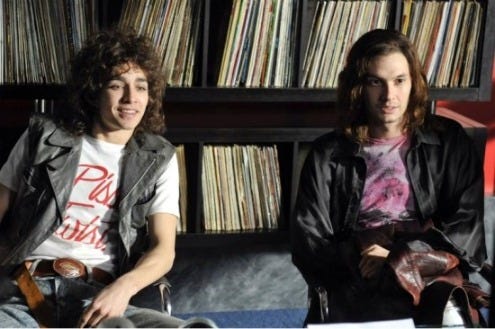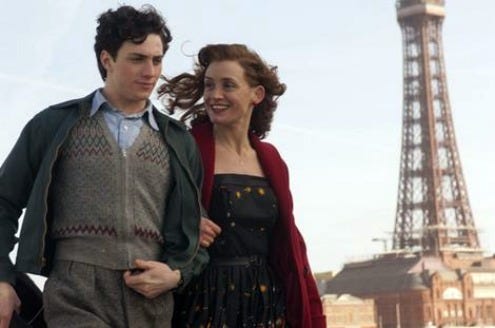Killing Bono
This commentary is part of an ongoing series discussing British films that you may have missed.

In his memoir, "I Was Bono's Doppelganger," author Neil McCormick details his misspent youth attempting to form a band in Dublin at the same time as his classmate was forming his own. That mate went on to become Bono of U2, one of the biggest bands in the world. McCormick went on to become the chief rock-music critic for the Telegraph newspaper.
"Killing Bono," the memoir's film adaptation, focuses on Neil’s brother Ivan and his try-and-fail method to get their band up and running. The film perhaps relies too heavily on the brother's failures rather than getting on with telling the full story. However, Ivan’s hapless mistakes have much comedic effect and redeem their constant failure to jump-start the band.
In his last on-screen appearance, the late British actor Pete Postlethwaite stars as the brothers' gay landlord, stealing the spotlight in every scene and strutting around amidst a gaggle of teenage boys. Ben Barnes is convincing as Neil, a role that takes him away from the usual hero/heartthrob characters he has previous played (most notably as corrupt Victorian Lord Dorian Gray). Barnes and Neil met on the set of the film in a rundown club in Belfast. Barnes was onstage exuding youth and ambition and prancing around to a song Neil wrote some 30 years before. Neil was watching from below cringing at his earlier self. Martin McCann (2010's "Clash of the Titans") stars as an eerily accurate double of Bono.
Despite the sometimes sprawling nature of the book spread over a lifetime of failures — during a phone call, Bono tells Neil he holds all the rock star’s bad luck — the film is directed at the everyman as director Nick Hamm intended. The appeal for him was that most people fail more than they succeed, and this spurred him to get the film made.
If you want to delve further into the British Music Hall of Fame, then you might want to check out the following three films. The central character in each has added very unique elements to modern music as a whole. Perhaps they should be viewed in reverse order, as the first is decidedly melancholic in nature.
"Control" (2007)
On the outside, Ian Curtis is known as a troubled musician in a trenchcoat with an upturned collar, one of the visionaries of punk rock. Inside lies a young boy suffering from an illness that is not treated properly and the strains of marrying young and trying to deal with his increasing fame. Curtis, lead singer of '70s punk band Joy Division, has epilepsy and depression, leading him to his suicide at the age of 23 in the pantry of his home.
In 1978, Ian meets with three dissatisfied members of a band at a Sex Pistols gig in Manchester. Afterward, he puts himself forward as their new lead singer, and the band (calling itself Warsaw) makes its debut at Electric Circus the following year. Ian and his wife, Debbie, finance the band's first recording as Joy Division with the EP "An Ideal Living."
In the next few years of life, under great strain from the band and his wife and young daughter, Ian suffers seizures and bouts of depression as Joy Division tours around Europe. He also embarks on an affair with fanzine journalist Annik Honore.
Although Joy Division has been remembered on celluloid before with 2002's "24-Hour Party People""Control" is served better by the fact that it uses Debbie Curtis’ biography of her husband, 1996's "Touching from a Distance," as its starting-off point. The other advantage is that it is directed by Anton Corbijn, who was so enamored with Joy Division's music that he moved to England to be closer to it. He followed the band and took pictures in its early days and eventually directed a music video for the song "Atmosphere" (after the group had renamed itself New Order). Corbijn has also directed videos for U2, REM and Metallica.
"Control" is filmed in color and printed to black-and-white afterward to reflect the mood of the time. Sam Riley (this year's "Brighton Rock") is spot on as Ian Curtis, and Morton (2002's "Minority Report") is perfect as Debbie, reflecting the earnestness that comes with trying to keep her young family together.
"Nowhere Boy" (2009)

From one rock star with an untimely end to another. "Nowhere Boy" is decidedly more upbeat, chronicling the early life of John Lennon and his years of adolescence involving the tumultuous triangle between himself, his Aunt Mimi and absent mom Julie.
The film feels very detached from the world phenomena that is the Beatles, and it is hard to imagine everything that came after Lennon’s early life living in Merseyside in the 1950s. Inspired by Elvis Presley and a meeting with a very young Paul McCartney, Lennon buys a cheap guitar and forms a band called the Quarrymen, using his poetry as lyrics. "Nowhere Boy’s" success is perhaps due to its roots in a relative's biography. Like "Control," it is based on a biopic of the star of the film. Lennon’s half-sister Julia Baird’s biography, "Imagine This: Growing Up With My Brother John Lennon" is not referenced in the end credits to the film, but the writing credit instead goes to Michael Greenhalgh (who also wrote the "Control" screenplay).
Although the film details how Lennon created his first band, it is centered more around his relationship with two of the most influential women in his life, his Aunt Mimi (Kristen Scott Thomas) and mother Julia Stanley (Anne-Marie Duff of 2001's "Enigma"). Both women had almost opposite influences on Lennon’s life. Mimi was more formidable and raised him with middle-class values, and Julia was more carefree and a lover of rock ‘n’ roll. As John grows more rebellious, it is Julia who becomes the larger influence and begins his musical destiny.
"Sex and Drugs and Rock and Roll" (2010)

Back to the world of punk, where director Mat Whitecross and Andy Serkis take us on the wild and rocky ride that is the life of Ian Dury, lead singer of the band Ian Dury and the Blockheads. It is the supporting cast that also makes this film great and adds moving touches to the story of a man who went from being a crippled and bullied boy to a still-crippled man, but one of rock 'n' roll's firm faces.
Ray Winstone plays Ian's dad, Bill, who appears at various points throughout the telling of Dury’s life like a cockney guardian angel. Naomie Harris (2002's "28 Days Later ...") is perhaps the softer side to Dury’s hard life, his young mistress Denise with whom he lives for six years.
The film is shot in such a way that you have to see it to really appreciate it. It is formed of fast cutting, animation, style, bold color and clips from newsreels that combine to reflect the chaotic nature of Dury’s drug-addled rampage through life.
The opening scene sets up Dury’s life as it means to go on from that point, in that it shows him rehearsing at home with his first band, Kilburn and the High Roads, while his wife, Betty (Olivia Williams of 2009's "An Education") gives birth upstairs. What follows details his struggles with two sides to his character and his life. On the one hand, he’s an egotistical, angry and cruel husband who frequently leaves Betty and son Baxter (Bill Milner of 2007's "Son of Rambow") to play gigs and rehearse. On the other, he is charming and witty with his girlfriend Denise, with whom he ends up shacking after Betty kicks him out. Then again, this reverses on many occasions, in that sometimes he goes back to reconcile somewhat with Betty while treating Naomie cruelly. The underlying fact to this chaotic character is that you never know what he’ll do next. Unpredictability is the key.
There's also some questionable parenting of Baxter, namely revealing too much about life to him too fast when Baxter first meets Denise after walking in on them engaging in oral sex. Still, Ian does come through as a father on some occasions, and Serkis is so like Dury it is difficult to picture him as anyone else. The resemblance is so uncanny and holds the film together well. Dury’s ego is so all-encompassing and affects anyone around him that the film may not have survived had it not been for Serkis’ performance.
Previous British commentaries:


